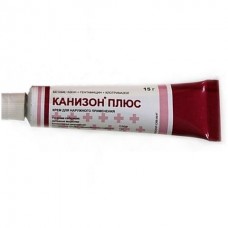Expiration date: 08/2026
Release form, composition and packing: cream for topical application
1 g contains:
betamethasone dipropionate 640 mcg
clotrimazole 10 mg
Gentamicin Sulfate 1 mg
15 g - tubes aluminum (1) - packs cardboard.
Clinico-pharmacological group: the drug with antibacterial, antifungal and anti-inflammatory for outdoor use
Pharmaco-therapeutic group: Glucocorticosteroids + aminoglycoside antibiotic, antifungal agent +
testimony
- Simple and allergic dermatitis (complicated by secondary infection)
- Atopic dermatitis (including atopic dermatitis)
- Eczema
- Ringworm (tinea, candidiasis, pityriasis versicolor), especially in the localization in the groin area and large folds of the skin,
- Simple chronic zoster (restricted neurodermatitis).
dosage
Outwardly.
Canison Plus cream should be applied a thin layer on the entire surface of the affected skin and surrounding tissue 2 times a day - morning and night. should be used regularly to ensure the effectiveness of treatment Canison Plus cream. The duration of therapy depends on the size and location of the lesion, as well as the patient's response.
If clinical improvement does not occur after 3-4 weeks of treatment, it can serve as a pretext for further diagnosis.
Side effect
It is very rare when using Canison Plus Cream observed: burning sensation, erythema, exudation, pigmentation disorders and itching.
Adverse reactions occurring in the application of local corticosteroids (especially when using occlusive dressings): burning sensation, itching, dryness, folliculitis, hypertrichosis, acne, hypopigmentation, perioral dermatitis, allergic contact dermatitis, maceration of the skin, secondary infection, skin atrophy, striae , sudamen.
Adverse reactions caused by clotrimazole: erythema, tingling, blistering, peeling, local swelling, itching, hives, skin irritation.
Adverse reactions caused by gentamicin: transient skin irritation (erythema, itching) usually does not require discontinuation of treatment.
Contraindications
- Lupus,
- Cutaneous manifestations of syphilis,
- chickenpox,
- Herpes simplex,
- Skin postvaktsianalnye reaction
- Open wounds,
- Children under 2 years old,
- Indication of hypersensitivity reactions to any of its components in the anamnesis.
Precautions: pregnancy (I term), long-term treatment, the use of large areas of the skin, or in violation of skin integrity, the use of occlusive dressings (especially in children).
Pregnancy and breast-feeding
It is not recommended to use the drug in the I trimester of pregnancy. In clinical and experimental studies, it was found that the use of clotrimazole during pregnancy has a negative effect on the health of the woman and the fetus. However, the question of the advisability of the appointment of the drug in the II and III trimester of pregnancy should be decided individually after consulting a doctor. The possibility of excretion of clotrimazole with breast milk has not been studied. Therefore Canison Plus cream for external use should be used in nursing mothers with caution.
Use in children
Children drug is prescribed only under strict indications and under medical supervision, as may develop systemic side effects associated with betamethasone. When applying the cream Canison Plus, like many other drugs for topical application on the basis of corticosteroids on large surfaces and / or occlusive dressing may suppress the function of the hypothalamic-gipofizonadpochechnikovoy system, there may be a reduction in excretion of growth hormone, and increased intracranial pressure.
special instructions
Canison Plus Cream is not intended for use in ophthalmology. Avoid getting the cream in the face.
Prolonged use of topical antibiotics may sometimes lead to the growth of resistant microflora, in this case, and if irritation, sensitization, or superinfection during treatment cream Canison Plus, treatment should be discontinued and appropriate therapy appoint. Cross-allergic reactions were observed with aminoglycoside antibiotics.
Any side effects that occur with systemic glucocorticoids, including suppression of adrenocortical function may be observed and the local application of glucocorticoids, especially in children.
Systemic absorption of corticosteroids or gentamicin local application will be higher if the treatment is carried out on large areas of the skin or use of occlusive dressings, especially with prolonged treatment or by violating the integrity of the skin. It is necessary to avoid the application of gentamicin on open wounds and damaged skin. Otherwise, it may cause side effects typical of gentamicin when administered systemically. Observe proper precautions in such cases, especially when treating children. With long-term use of the drug is recommended its abolition gradually.
Use in Pediatrics
Children drug is prescribed only under strict indications and under medical supervision, as may develop systemic side effects associated with betamethasone. When applying the cream Canison Plus, like many other drugs for topical application on the basis of corticosteroids on large surfaces and / or occlusive dressing may suppress the function of the hypothalamic-gipofizonadpochechnikovoy system, there may be a reduction in excretion of growth hormone, and increased intracranial pressure.
Overdose
Symptoms include long-term use of corticosteroids in high doses may suppress adrenal function with the development of secondary adrenal insufficiency and Cushing's symptoms, including Cushing's syndrome.
An overdose of clotrimazole topically its application does not lead to the appearance of any symptoms.
When a single overdose of gentamicin appearance of any symptoms and is not expected.
Long-term treatment gentamitsnnom in high doses can lead to growth insensitive flora.
Treatment: symptomatic. Acute symptoms of Cushing's usually reversible. If necessary, a correction of electrolyte imbalance. In case of chronic toxicity glucocorticosteroid is recommended phasing out of glucocorticosteroids.
Drug interactions
In an application Canison Plus with antifungals other groups reduces the effectiveness of drugs used topically. Using gentamicin may lead to overgrowth of refractory (high degree of stability) of microorganisms, including fungi. If within the therapeutic course of treatment with gentamicin superinfection occurs, the drug should be discontinued and appropriate therapy appoint a course.


